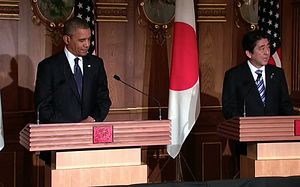These pages recently saw the latest round of a familiar debate: Will the U.S. defend Japan in the event of war with China? Paul Sracic says maybe not; Jun Okumura says yes. The authors’ contributions are certainly valuable. Yet fundamentally they did not address the right question.
Japanese political leaders do not lay awake at night worrying in binary terms whether America will abandon them. What really animates them is not if, but how the U.S. would aid Japan. Framing the discussion in this way better explains American strategic ambiguity and Japanese military hedging.
Start with the assumption that if there was a serious crisis, skirmish, or war in the East China Sea, America would do something. The United States’ security relationship with Japan stretches back seven decades. It stations around 50,000 military personnel on Japanese soil. President Barack Obama clearly stated back in April that the Mutual Security Treaty covers the disputed Senkaku/Diaoyu Islands, calling the American security guarantee “absolute.” If armed conflict erupted with China, it is almost inconceivable that the U.S. would not provide some kind of military assistance to its most important ally in Asia.
So if America’s commitment demands that it defend Japan, why the enduring ambiguity? Although the State Department did so immediately, the president himself waited two tense years after the original 2012 nationalization spat to clarify U.S. treaty obligations. He was quick to soften the blow when he finally did. In a joint press conference with Japanese Premier Shinzo Abe, Obama was asked if the U.S. would consider using force to help Japan defend the islands against a Chinese military incursion. He gave an awkward response, implying that if his previous statement was a “redline,” then his administration was not responsible for drawing it. If Obama had wanted to send an unambiguous signal of resolve, he could have simply answered, “Yes, we would.” It is because of this evasion of definitive answers that we keep having these debates about U.S. credibility. But it would be a mistake to think the equivocation is accidental or the result of policy confusion.
The strategic reason for Washington’s ambiguity is that it does not want to go to war over rocks if it does not absolutely have to. The Senkakus are intrinsically worthless to most U.S. defense planners and certainly to the American public. In a time of budget austerity, there is little stomach for spending American blood and treasure guarding far-flung territory that Japan has the manpower, technological skill, and wealth to defend itself. Nor does the U.S. wish to unnecessarily provoke China or write a blank check to a Japanese premier who has shown little grasp of his neighbors’ national sentiments. For the sake of deterrence, America may want to entangle itself in Japan’s security affairs, but it still does not want to be entrapped into fighting a war with China unless it is truly unavoidable.
This attitude governs what exactly Obama would offer Abe if the no-longer-so-unthinkable happened. Here we must rely on speculation. Given the push and pull factors listed above, however, we can guess that the U.S. will most likely provide military aid, and it will most likely be limited. Washington would face a choice between two basic options: direct or indirect military assistance. It is possible that either a very bold or a very ill-advised administration could choose the former and immediately send American assets steaming into a crisis or war scenario. A group of retired senior officials did just that in a November 2013 simulation.
Then again, the U.S. might hold back. Fearing undue escalation or simply unnecessary involvement, America might force Japan to handle the forward operating area by itself in a small-scale incident, skirmish, or limited battle. In this scenario, the U.S. would provide mainly logistical support, including satellite imagery and AWACS aircraft. Carrier strike groups and B-2 squadrons would probably be scrambled over the horizon as a signal of American willingness to intervene if China chose to escalate. In fact, this indirect approach seems to enjoy more support in Washington today.
Japan, for its part, already believes U.S. military assistance will be limited, and this belief is shaping its military hedging and defense reforms. The Japanese are well aware of America’s reluctance to shed blood for the Senkakus. Given this knowledge, Tokyo has two choices: it can push hard for stronger U.S. promises and risk damaging the alliance over what Washington views as a peripheral interest, or it can accept the new burdensharing arrangement and adapt.
It appears to be choosing the latter. The Self Defense Forces are rapidly acquiring new capabilities more suitable to remote island defense and shifting much of their posture to the southwest. Yukio Okamoto, a special advisor to multiple Japanese prime ministers, told an American panel this March that Japan should not ask the U.S. for direct military assistance in the case of the Senkakus. It seems like every time Abe and Foreign Minister Itsunori Onodera drop by Washington, they are reassuring the U.S. that Japan has the primary responsibility for its own defense. So regardless of how Americans think the administration would intervene in a conflict with China, Japan is already moving ahead on the assumption that it would be indirect.
It remains uncertain how exactly the United States would defend Japan, but this question better captures what actually matters for regional strategies and fears: the twilight between duty and desertion.
Jake A. Douglas is a 2014-15 Boren Scholar at Peking University. His views do not represent those of the National Security Education Program. You can find him on Twitter @JakeADouglas.

































